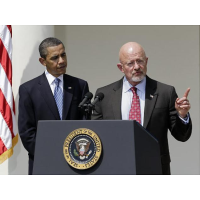Obama and NSA Surveillance: What Won’t Change
 Barack Obama and Director of National Intelligence James Clapper (photo: J. Scott Applewhite, AP)
Barack Obama and Director of National Intelligence James Clapper (photo: J. Scott Applewhite, AP)
President Barack Obama’s announcement on Friday regarding changes to National Security Agency (NSA) surveillance fell considerably short of what critics wanted, and left many controversial programs and policies in place.
For starters, the vast collection of Americans’ telephone records by the NSA will continue. Obama believes the program is too important to shut down. But he promised to move the storage of these records, or metadata, out of government hands and into private ones. No specifics were provided, except that Obama called on the Department of Justice to work with the NSA and devise a plan within 60 days.
The NSA will still be able to access the phone records, even after their move. But, going forward, any search of the metadata will require approval by the Foreign Intelligence Surveillance Court (FISC)—unless ”a true emergency” requires the NSA to act first without a judicial okay.
For the most part, Obama’s announcement included very little change to the NSA’s spying that came to light following the leaks of whistleblower Edward Snowden.
“In fact, what President Obama has announced will have little operational effect on the National Security Agency's collection of Americans' data,” James Oliphant wrote at National Journal.
“And, significantly, the administration has attempted to dodge some of the biggest decisions, passing the ball to Congress, which will likely do nothing if recent trends hold,” he added.
Going back to the phone records, the president’s blue-ribbon panel that investigated NSA surveillance programs recommended the government keep the metadata for only two years, instead of the current five. Obama failed to address this recommendation, maintaining the status quo.
The panel also recommended that a court order be necessary to search databases containing Americans’ emails or phone calls that were incidentally intercepted without a warrant while targeting foreigners abroad. Again, Obama called for no action on this subject. He only said that he would ask Attorney General Eric Holder Jr. and Director of National Intelligence James Clapper to brainstorm some ideas for limiting the government’s ability to retain, search and use these communications of Americans.
National Security Letters, which federal agents have used thousands of times to force businesses to turn over information about their customers, was another important subject addressed by the panel. It said a court order should first be obtained before the Federal Bureau of Investigation uses these subpoenas.
Obama rejected this recommendation. He only promised to reduce secrecy surrounding the letters, such as lifting the gag order that prevents businesses from discussing the letters after a certain period of time.
One NSA revelation from last year that stirred uproar was the spying on phone calls and emails of foreign leaders, particularly those considered allies of the United States. Obama promised such surveillance would cease “unless there is a compelling national security purpose.”
Other panel recommendations, and Obama’s response/non-response to them, included:
- Establish a public advocate to argue against the Justice Department in secret proceedings before the FISC. Obama: Advocates will appear before the court, but only in special cases, and they will not be allowed to monitor the court’s caseload.
- Give foreigners the same privacy privileges to information that Americans have under federal law. Obama: We’re working on new safeguards to address this matter.
- Change the way judges are selected for the FISC. Obama: Let Congress decide this.
- Don’t let the NSA “subvert, undermine, weaken or make vulnerable generally available commercial encryption” or standards. Obama: No mention of this in his speech.
-Noel Brinkerhoff
To Learn More:
Obama’s Changes to Government Surveillance (by Josh Keller, Alicia Parlapiano, David E. Sanger and Charlie Savage, New York Times)
Obama's NSA Proposals Fall Far Short of Real Change (by James Oliphant, National Journal)
Rating Obama’s NSA Reform Plan: EFF Scorecard Explained (by Cindy Cohn and Parker Higgins, Electronic Frontier Foundation)
Four Questionable Claims Obama Has Made on NSA Surveillance (by Kara Brandeisky, ProPublica)
Judges Clash over Whether NSA Phone Data Collection is Lawful (by Matt Bewig, AllGov)
NSA Phone Data Collection Made No Difference to National Security (by Noel Brinkerhoff and Danny Biederman, AllGov)
- Top Stories
- Unusual News
- Where is the Money Going?
- Controversies
- U.S. and the World
- Appointments and Resignations
- Latest News
- Trump Renames National Football League National Trump League
- Trump to Stop Deportations If…
- Trump Denounces World Series
- What If China Invaded the United States?
- Donald Trump Has a Mental Health Problem and It Has a Name






Comments